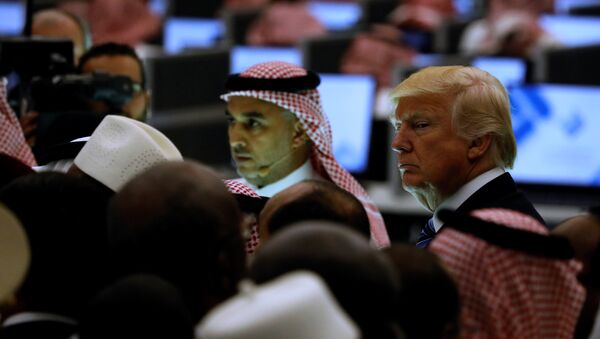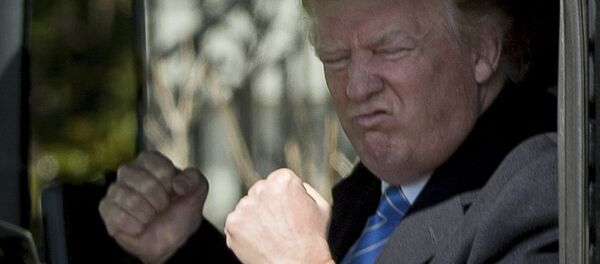Donald Trump received a warm greeting when he arrived in Riyadh on Saturday for his first official foreign visit, the highlight of which was the signing of a massive arms deal worth upwards of $110 billion.
In spite of Trump's anti-Saudi and anti-Muslim rhetoric in the past, the two countries are set to enjoy better relations than existed under the Obama administration because they have complementary economic and military objectives, Theodore Karasik, a senior advisor at Gulf State Analytics, told Radio Sputnik.
"They complement each other in the sense that the America First program is about how the US can rejigger its economy, shrink government and be able to produce jobs for American citizens who elected President Trump to do this duty."
"On the Saudi side of the house, the Vision 2030 is a program meant to transform the Saudi economy into a more 'postmodern age' that will provide jobs for Saudi youth. Given the youth bubble in Saudi Arabia, these youths need to have jobs in the near to medium term, so there's the symbiosis between these two countries."
"There's no doubt that the Saudis and their allies have been upset with the US for the past eight years under the former President Barack Obama. The Saudis were waiting for a new President to be elected in the US in order to reshape the relationship between Washington and Riyadh."
During his trip, Trump signed nearly $110 billion worth of weapons deals with Saudi Arabia, which could be worth as much as $350 billion over the next ten years. Karasik says that the agreement is part of a US strategy to give more "punch" to Arab militaries that would allow the US to concentrate on working with other countries to try and settle the wars in Syria, Yemen and Libya.
"What the Yemen war really signifies is that the Saudi-led coalition wants to become a larger security organization and this is where we have talked about an Arab NATO and also the formation of the Islamic military alliance to fight terrorism."
"What you see now is the opening days of years of how to organize, train and equip yourself appropriately and not have to rely on other powers for defense," Karasik said.
Although there are several wars ongoing in the Middle East, many regional players are "grouping together" in an effort to find solutions to the conflicts.
"The wars in Syria, Yemen and in Libya may very well be over in a year, if Arab states and their allies are able to agree on how best to move forward and allow citizens of these countries to decide the outcome themselves."
"You see now a real push in Abu Dhabi, Moscow, Washington and other capitals to try to come to some kind of balanced agreement in the region where there is burden-sharing. The creation of safe zones for example is an ongoing process between Russia and the US despite the disruption in American society because of the supposed ties between the Trump administration and Russia."
"So, there's a lot in play right now, I think that it's going to look more complicated in the short-term but there are powers-that-be in the region and extra-regional powers that are working hard publicly but also behind the scenes to try to settle these issues in a timely manner, perhaps by the end of the year."
Have you heard the news? Sign up to our Telegram channel and we'll keep you up to speed!






